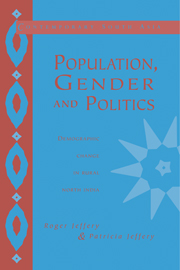Book contents
3 - ‘In these expensive times’
Published online by Cambridge University Press: 07 January 2010
Summary
One of Mamdani's central claims was that almost all rural Punjabis were acting with economic rationality in having large numbers of children. In particular, he argued that a farm labourer's income ‘will depend upon the amount of work his family can contract during the busy season. A larger family means a greater income during the busy season and higher savings for the slow season’ (Mamdani 1972: 95). For small and medium landowners, sons can bring in wages from a young age; as they get older their work can enable their fathers to avoid hiring labourers to work on family farms, and to generate a surplus which allows them to buy more land. Only for large landowners who had enough access to capital to purchase tractors, was there an economic incentive to have small families (Mamdani 1972: 87). On a similar basis John Caldwell has developed a much more sophisticated general economic analysis of demographic transitions (Caldwell 1982). Before a transition from high and fluctuating to low and stable mortality and fertility rates, he argued, wealth flows from the young to the elderly. Couples have many children when their investment in rearing children is small relative to the income that the child can generate for the parents. When the costs of rearing children rise (especially with compulsory education, and when women can no longer combine their own paid work with child care) or when children's employment opportunities fall, the relationship shifts.
- Type
- Chapter
- Information
- Population, Gender and PoliticsDemographic Change in Rural North India, pp. 73 - 116Publisher: Cambridge University PressPrint publication year: 1997



